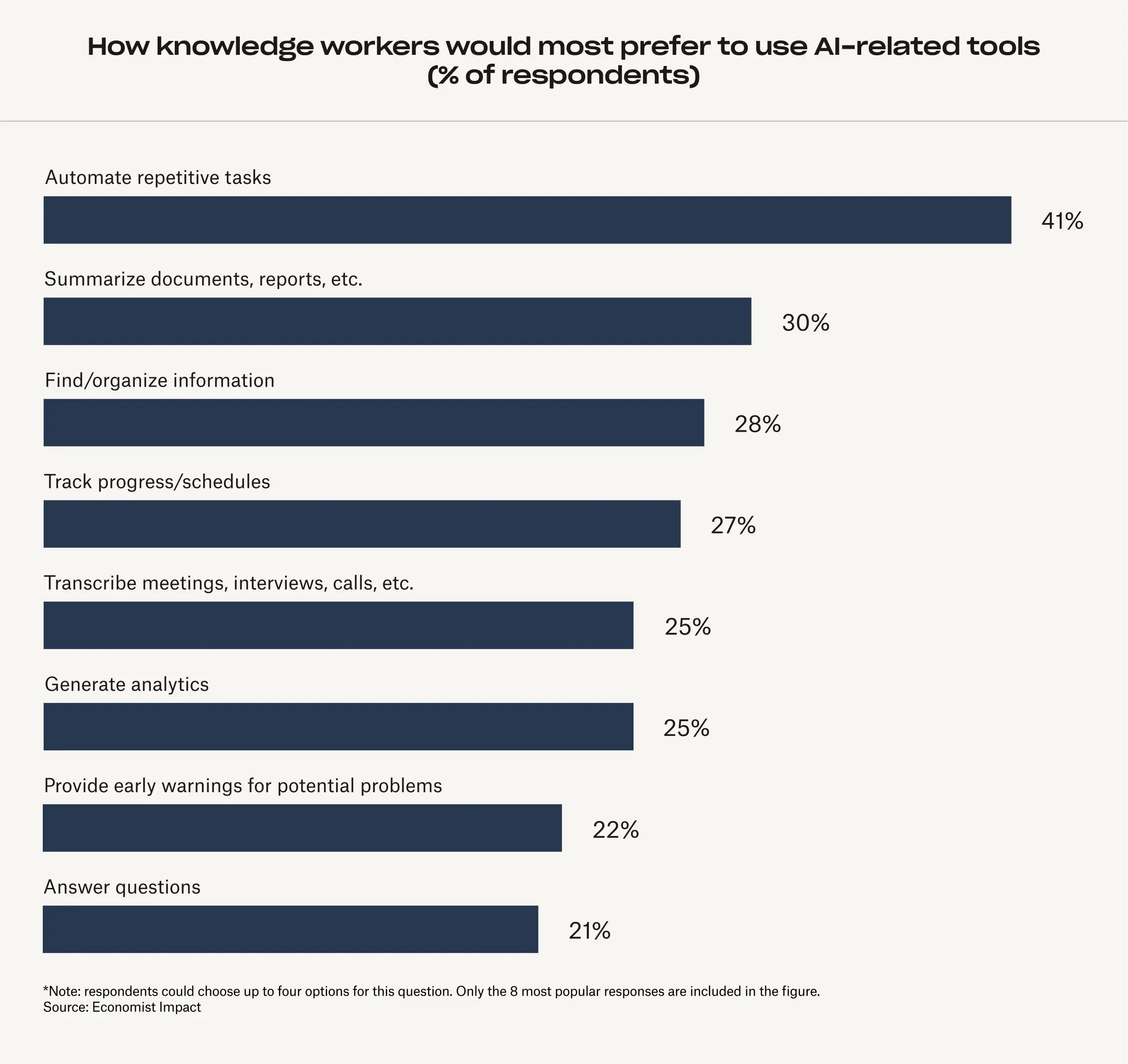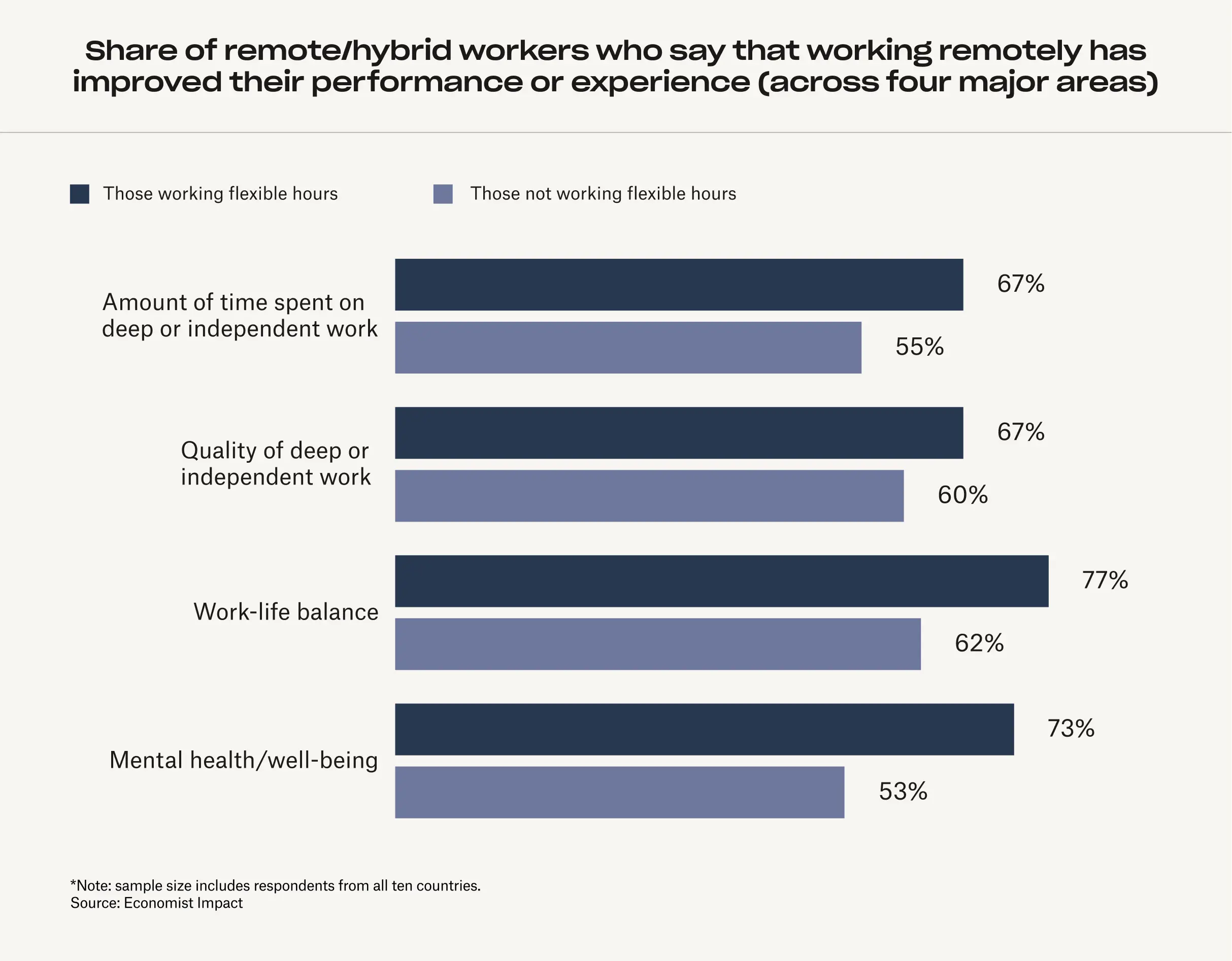Study: Here’s how many hours we lose to distraction—and how to get our focus back
Published on October 10, 2023
Is there anything more elusive than trying to find focus at work? Messages and meetings compete for our attention. Alerts and notifications take us out of the moment. And just when we think we can finally concentrate, a forgotten fact or misplaced document is all it takes to break the spell of a productive flow.
All that time, lost, as we sift through folders, emails, and browser tabs in search of the answers we need to do our jobs.
Distractions like these cost us hundreds of hours each year. And it’s not just wasted time—it’s wasted potential. When we spend our limited time on repetitive, tedious tasks—on work about work—that’s time we could have put towards more meaningful, important, impactful goals.
But it doesn’t have to be this way. New research suggests a mix of AI-powered tools, flexible working arrangements, and async communication strategies can help us achieve a more enlightened way of working—where technology amplifies our brain power, rather than wastes it.
In a Dropbox-sponsored study, we asked Economist Impact to help us better understand the challenges facing knowledge workers today, and how knowledge work has changed since the start of the pandemic. Economist Impact surveyed more than a thousand knowledge workers about their jobs—ranging from general staff to executives, across retail, manufacturing, technology, and more—and modeled the economic cost of lost focus in ten countries around the world.
Of note, the study found that…
- The economic opportunity of addressing lost focus is nearly $1.4 trillion in the US alone, followed by Germany ($244 billion), the UK ($188 billion), Japan ($176 billion), and France ($153 billion).
- AI and automation tools are already having an outsized impact on how knowledge workers stay focused and get work done. Of those who report using automation tools in their work—which are increasingly powered by AI—79% are more productive, while nearly 70% said they’re more organized.
- Finding focus isn’t just about where you work, but how. Remote workers said they were happier and more productive when working at home. Office workers felt the same about working in person. Flexibility is key—but so are intentional practices that help knowledge workers find and preserve time for focused work, whether they work virtually or on-site.
- We need better ways to communicate, get answers, and find what we need. Workplace chat apps have been a boon for collaboration, but are also one of the top disruptors of productive work around the world. In fact, half of the time knowledge worker spend on chat messages is wasted each day.
Whether you work from home, an office, or somewhere in between, distractions are an inescapable part of our lives—but not all distractions are inevitable. As companies continue to embrace new ways of working—the way Dropbox has with Virtual First—we believe these findings offer a valuable glimpse into the evolution of knowledge work, and the tools and strategies helping knowledge workers make the best, most meaningful use of their time.
The cost of lost focus
We first worked with Economist Impact in 2020 to study the cost of lost focus in the US. For our 2023 study, Economist Impact included knowledge workers globally—and found that, no matter where people work, there’s a significant cost to lost focus around the world.
In the US, where salaries are highest, $468 billion is lost to distractions each year. Finding focus would not only be a boon for knowledge workers and their companies, but growth in their country’s economy overall. Increasing productivity could increase knowledge workers’ economic output across the ten countries studied by an average of 40%—with nearly $1.4 trillion in potential growth in the US economy alone.

Globally, managers especially struggle to maintain focus, with 683 hours lost to distraction annually. In fact, managers lost more than 100 additional hours of productive time compared to other roles, which averaged 553 hours lost each year—driven in large part by unproductive meetings and administrative tasks. Put another way: lost focus costs companies $37,000 per manager, compared to $21,000 for other roles.
Finding answers—and focus—with AI
Whether it’s searching for inscrutably named files, answering the same questions again and again, or summarizing yet another interminable meeting, it can sometimes feel like work about work leaves little time left for our actual jobs.
Economist Impact found that knowledge workers are increasingly turning to automation tools—which can include AI—for help. Of the people surveyed who reported using such tools, 79% say they’re more productive, while nearly 75% of those surveyed said the quality of their work and time spent on repetitive tasks had improved. Nearly 70% said they were more organized.
42% of people surveyed say they typically don’t spend more than an hour on productive work without interruption
We also wanted to know what people expect from AI in the future. After all, the more friction our tools can remove from our day-to-day tasks, the more time we’ll have to spend on innovative, collaborative, and creative work. Perhaps unsurprisingly, automating repetitive tasks was at the top of the list, preferred by more than 40% of respondents. Nearly 30% said they want tools that will help them find, organize, and summarize information, while more than 20% wanted tools that could answer questions—precisely the kinds of capabilities Dropbox has been building into Dropbox Dash and Dropbox AI.

Meetings, in particular, could benefit from a dose of AI. In our latest internal findings—gathered from in-depth interviews and surveys with Dropbox employees, led by our People Analytics team and external researchers—Dropboxers have also told us there are hidden costs to meetings not counted on a calendar. There’s the time it takes to prep, and time to process after. Having a series of unrelated meetings can make context switching even worse. It’s not hard to imagine AI tools taking on some of that cognitive load—from transcribing and summarizing the meeting itself, to collecting and organizing prep material—leaving more time for focus, and less work about work.
In fact, the prevailing sentiment among those surveyed by Economist Impact was that AI and automation will help knowledge workers do their jobs better, smarter, and more efficiently—not put their jobs at risk. Of those who said they rely on AI and automation, 86% said that such tools had either improved or not affected their sense of job security. This held generally consistent across generations, from Gen Z through to Baby Boomers.
It’s not just where you work, but how
For some, finding focus depends on when they work—for example, working whenever they feel the most productive throughout the day, rather than working for eight hours straight. According to Economist Impact, two-thirds of knowledge workers say they work flexible hours at home, and those who do are more likely to report improvements in focus time, quality of work, and well-being.
For others, finding focus is influenced by where they work. Of those surveyed by Economist Impact, remote workers found their productivity and well-being to be better when working from home, while on-site workers said the same about working from an office. This could suggest knowledge workers are self-selecting into the environment where they feel most productive.
But finding focus isn’t just about when or where you work, but how.

At Dropbox, for example, we’ve adopted a set of intentional practices, shared company-wide, that help people make the best use of their time—no matter when or where they choose to work. Async-by-default means attempting to solve problems with tools like Dropbox Dash or Dropbox Capture before reflexively scheduling a meeting. Any remaining meetings are limited to core collaboration hours—four-hour blocks of time each day for real-time communication and team-based work.
When practiced together, these intentional, behavioral shifts enable Dropboxers to spend at least half of their day on independent, focused work. In our most recent employee survey, 76% of Dropboxers reported having enough focus time in our Virtual First work environment—but among knowledge workers more generally, we know this is still the exception, rather than the rule. 42% of people surveyed by Economist Impact say they typically don’t spend more than an hour on productive work without interruption.
157 hours are lost to unproductive workplace chat messages each year—the biggest cause of lost focus overall
Working from home isn’t necessarily more or less distracting than working from an office, either. Those who work from home cite household chores and demands from others as top distractions, whereas interruptions from colleagues were still a top distraction for those working on-site. The type of distraction may be different, but the distraction itself remains—making it all the more important that knowledge workers have the tools and strategies they need to find focus no matter where or when they work.
Stemming the tide of pings and chimes
Reducing the cognitive burden of work about work is key to reaching our full potential. But from meetings to messages, it can often feel like our attention is constantly being stolen from the task at hand.
For example, chat apps and other collaboration tools have been key enablers of remote work, but they can also be a source of distraction and stress. 60% percent of those surveyed said these tools made them feel pressured to quickly respond to incoming messages, and 63% said they felt like they had to be available all the time.
Economist Impact also found unproductive meetings cost knowledge workers 79 hours each year, while another 157 hours are lost to unproductive messages from workplace chat apps—the biggest driver of lost focus overall.
Addressing unproductive work-related chat messages alone could yield some of the greatest potential economic gains: $31,000 per knowledge worker in the US ($360 billion nationwide, or 11% of their annual economic output). If we could give people even some of that time back, just imagine what they could achieve.

And that’s to say nothing of the time spent recovering from distractions such as emails or meetings—127 hours each year for the average US knowledge worker, up nearly ten hours since Economist Impact’s previous study. Things aren’t much better in the rest of the world, either. The average Korean spent 112 hours of their year seeking to regain focus after an interruption, while Australia and the UK topped the list at 131 hours.
We can’t eliminate every distraction, but we can embrace new tools to bring order to the chaos. This could mean everything from finding answers with Dropbox Dash instead of having to send a Slack message or email, or using automatically generated transcriptions and summaries to make meetings more manageable. However this looks for knowledge workers in practice, AI tools are likely to be key.
It’s our belief that a more enlightened way of working is also a less distracted way of working. The easier it is for knowledge workers to find, share, and organize the information they need, the more likely it is that whatever interruptions remain will actually be worth their time. And the easier it is to find focus, the more time can be spent on the work that matters most.
~ ~ ~
To read the full report, visit Economist Impact.
Disclaimer: The views expressed in this article are those of the authors. They are an independent analysis of the survey data produced by Economist Impact and do not reflect the views of Economist Impact.
 Dropbox Dash: The AI teammate that understands your work
Dropbox Dash: The AI teammate that understands your work


